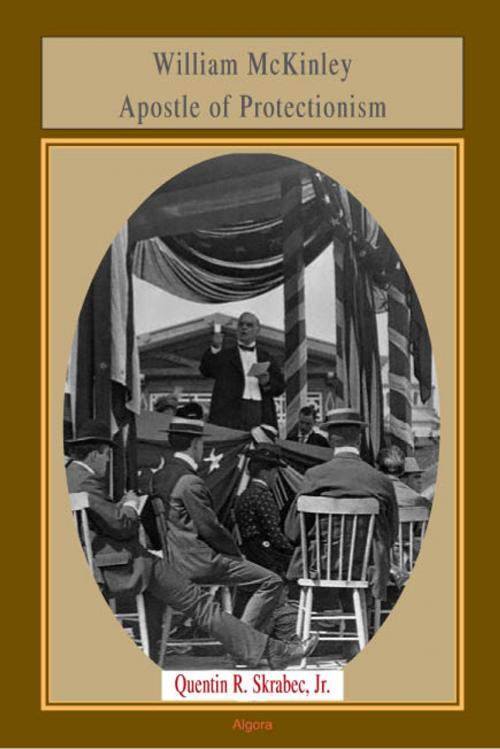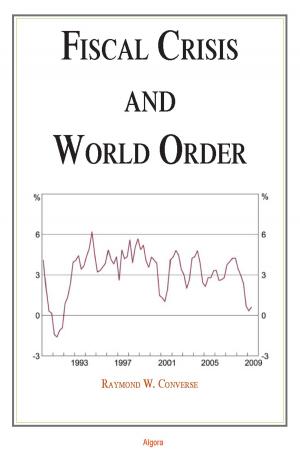| Author: | Quentin R. Skrabec, Jr. | ISBN: | 9780875865782 |
| Publisher: | Algora Publishing | Publication: | December 15, 2009 |
| Imprint: | Algora Publishing | Language: | English |
| Author: | Quentin R. Skrabec, Jr. |
| ISBN: | 9780875865782 |
| Publisher: | Algora Publishing |
| Publication: | December 15, 2009 |
| Imprint: | Algora Publishing |
| Language: | English |
William McKinley was the first US president to address globalization; his legacy in protectionism and immigrant labor offer lessons for the current era. He orchestrated an alliance between big business and the American worker that ushered in one of the greatest periods of growth ever known in the US economy. Yet McKinley has been in the shadow of his successor Theodore Roosevelt for over a hundred years.
As Chairman of the Ways and Means Committee, McKinley had forged a tariff bill in 1888 that united a nation that was still divided between North and South, East and West. His continued efforts to support free trade, protected by managed markets in the tradition of Henry Clay, and worker benefits like those provide by George Westinghouse, led to a great economic compromise.
Further, with revolutionary, visionary rhetoric laden with AmericaÂs Âeconomic manifest destiny he appealed to everyone from the steelworkers of Pittsburgh to the New York bankers. He articulated a uniting philosophy: ÂFree trade in the United States is founded upon a community of equalities and reciprocities [F]ree foreign trade admits the foreigner to equal privileges with our citizens. It invites the product of foreign cheap labor to this market in competition with the domestic, representing better paid labor [albeit with tariffs to protect that domestic product].
McKinleyÂs vision built the industrial base of the nation. By the end of his presidency the American steel, glass, rubber, oil, machinery and electrical appliance industries dominated the world.
He was one of AmericaÂs most popular presidents. As his funeral train crossed the nation in 1901, factory workers and captains of industry alike stood along the rails to mourn him. Never since has such a political alliance between labor and management been forged.
He was the last president to build a voting alliance between laborers, immigrant workers, and capitalists. That alliance was marred by famous labor strikes and the building of great trusts, yet he still managed to sweep the labor votes in the great industrial centers  due to his belief in reciprocity and protectionism.
McKinleyÂs role as a Âdinner pail Republican offers insights into how America can approach todayÂs globalization with the best interests of the Âhome team in mind.
As Chairman of the Ways and Means Committee, McKinley had forged a tariff bill in 1888 that united a nation that was still divided between North and South, East and West. His continued efforts to support free trade, protected by managed markets in the tradition of Henry Clay, and worker benefits like those provide by George Westinghouse, led to a great economic compromise.
Further, with revolutionary, visionary rhetoric laden with AmericaÂs Âeconomic manifest destiny he appealed to everyone from the steelworkers of Pittsburgh to the New York bankers. He articulated a uniting philosophy: ÂFree trade in the United States is founded upon a community of equalities and reciprocities [F]ree foreign trade admits the foreigner to equal privileges with our citizens. It invites the product of foreign cheap labor to this market in competition with the domestic, representing better paid labor [albeit with tariffs to protect that domestic product].
McKinleyÂs vision built the industrial base of the nation. By the end of his presidency the American steel, glass, rubber, oil, machinery and electrical appliance industries dominated the world.
He was one of AmericaÂs most popular presidents. As his funeral train crossed the nation in 1901, factory workers and captains of industry alike stood along the rails to mourn him. Never since has such a political alliance between labor and management been forged.
He was the last president to build a voting alliance between laborers, immigrant workers, and capitalists. That alliance was marred by famous labor strikes and the building of great trusts, yet he still managed to sweep the labor votes in the great industrial centers  due to his belief in reciprocity and protectionism.
McKinleyÂs role as a Âdinner pail Republican offers insights into how America can approach todayÂs globalization with the best interests of the Âhome team in mind.
William McKinley was the first US president to address globalization; his legacy in protectionism and immigrant labor offer lessons for the current era. He orchestrated an alliance between big business and the American worker that ushered in one of the greatest periods of growth ever known in the US economy. Yet McKinley has been in the shadow of his successor Theodore Roosevelt for over a hundred years.
As Chairman of the Ways and Means Committee, McKinley had forged a tariff bill in 1888 that united a nation that was still divided between North and South, East and West. His continued efforts to support free trade, protected by managed markets in the tradition of Henry Clay, and worker benefits like those provide by George Westinghouse, led to a great economic compromise.
Further, with revolutionary, visionary rhetoric laden with AmericaÂs Âeconomic manifest destiny he appealed to everyone from the steelworkers of Pittsburgh to the New York bankers. He articulated a uniting philosophy: ÂFree trade in the United States is founded upon a community of equalities and reciprocities [F]ree foreign trade admits the foreigner to equal privileges with our citizens. It invites the product of foreign cheap labor to this market in competition with the domestic, representing better paid labor [albeit with tariffs to protect that domestic product].
McKinleyÂs vision built the industrial base of the nation. By the end of his presidency the American steel, glass, rubber, oil, machinery and electrical appliance industries dominated the world.
He was one of AmericaÂs most popular presidents. As his funeral train crossed the nation in 1901, factory workers and captains of industry alike stood along the rails to mourn him. Never since has such a political alliance between labor and management been forged.
He was the last president to build a voting alliance between laborers, immigrant workers, and capitalists. That alliance was marred by famous labor strikes and the building of great trusts, yet he still managed to sweep the labor votes in the great industrial centers  due to his belief in reciprocity and protectionism.
McKinleyÂs role as a Âdinner pail Republican offers insights into how America can approach todayÂs globalization with the best interests of the Âhome team in mind.
As Chairman of the Ways and Means Committee, McKinley had forged a tariff bill in 1888 that united a nation that was still divided between North and South, East and West. His continued efforts to support free trade, protected by managed markets in the tradition of Henry Clay, and worker benefits like those provide by George Westinghouse, led to a great economic compromise.
Further, with revolutionary, visionary rhetoric laden with AmericaÂs Âeconomic manifest destiny he appealed to everyone from the steelworkers of Pittsburgh to the New York bankers. He articulated a uniting philosophy: ÂFree trade in the United States is founded upon a community of equalities and reciprocities [F]ree foreign trade admits the foreigner to equal privileges with our citizens. It invites the product of foreign cheap labor to this market in competition with the domestic, representing better paid labor [albeit with tariffs to protect that domestic product].
McKinleyÂs vision built the industrial base of the nation. By the end of his presidency the American steel, glass, rubber, oil, machinery and electrical appliance industries dominated the world.
He was one of AmericaÂs most popular presidents. As his funeral train crossed the nation in 1901, factory workers and captains of industry alike stood along the rails to mourn him. Never since has such a political alliance between labor and management been forged.
He was the last president to build a voting alliance between laborers, immigrant workers, and capitalists. That alliance was marred by famous labor strikes and the building of great trusts, yet he still managed to sweep the labor votes in the great industrial centers  due to his belief in reciprocity and protectionism.
McKinleyÂs role as a Âdinner pail Republican offers insights into how America can approach todayÂs globalization with the best interests of the Âhome team in mind.















